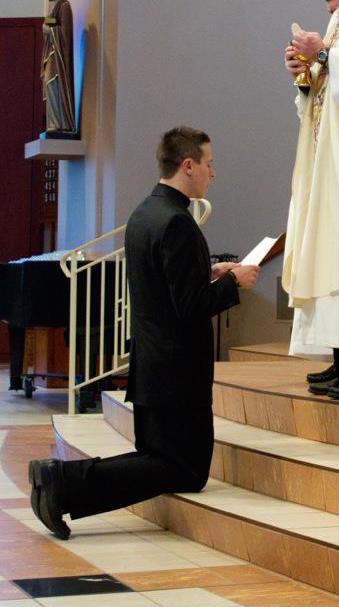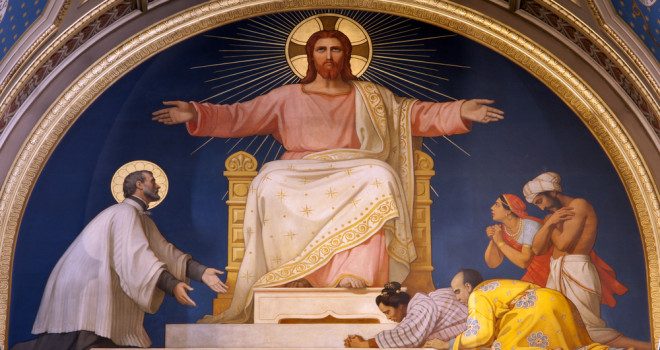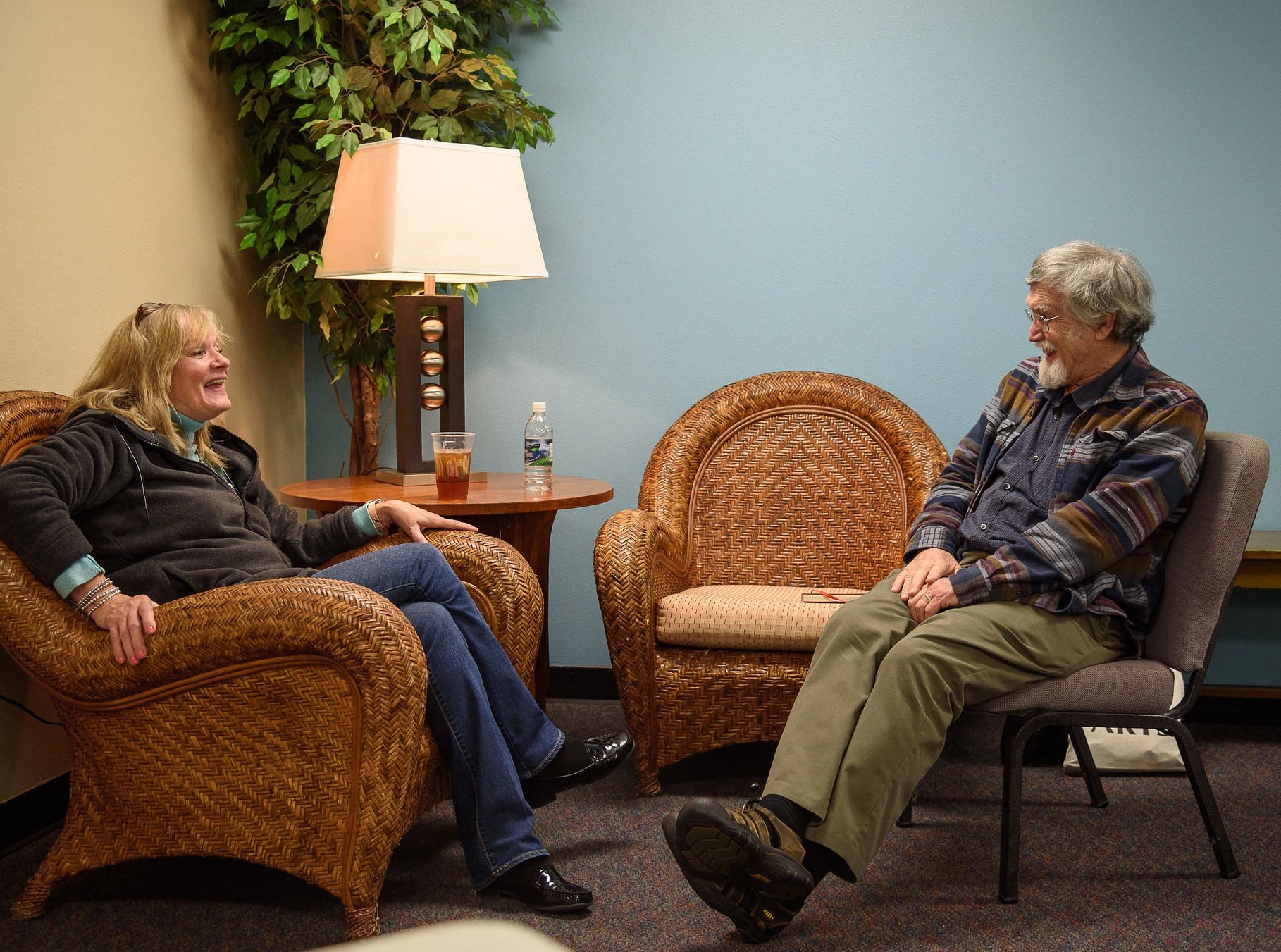
My vows as a Jesuit
For many of us, the only vows we may have professed were marriage vows. The word itself tends to evoke thoughts of a wedding day more than anything else. There are also religious vows. These vocational vows carry a lot of weight! When I first knelt down as a Jesuit novice to profess life-long perpetual vows of chastity, poverty, and obedience I felt as if all of heaven was watching me. In fact, the vow formula contains the words, “I vow to your divine Majesty, before the most holy Virgin Mary and the entire heavenly court…”
As you may know, I later discerned that God was calling me to married life, so I left religious life. When I professed my marriage vows to my wife the words were different but they too were professed not just before Sarah, the priest and deacon, and our friends and family. They, too, were professed before all those in heaven, those gone before me. But what makes vows different than promises?
A vow is three things: a deliberate and free promise, an act of devotion, and one made for the sake of a greater good.
This means that a marriage or religious vow is made in response to an other (God or another person) in devotion to that other, and it’s made with the expectation that such a vow will bring about something greater. In other words, there will be fruit as a result of the vow. In the story Les Misérables, Jean Valjean makes a vow to Fantine that he will take her daughter Cosette under his care. This was done out of devotion to both Fantine and to Cosette in the hope of a better life for Cosette.
Any vow we make is in the service of a greater good, what Jesuits might ultimately say is Ad Majorem Dei Gloriam (for the greater glory of God).
What Ignatius says
Outside of the Jesuit Constitutions, Saint Ignatius never said much about vows in general, but he does emphasise how sacred they are. In the 14th Annotation of the Spiritual Exercises he tells directors:
If he who is giving the Exercises sees that he who is receiving them is going on in consolation and with much fervor, he ought to warn him not to make any inconsiderate and hasty promise or vow. […] one should carefully consider the circumstances and personal qualities of the individual and how much help or hindrance he is likely to find in fulfilling the thing he would want to promise.
In other words, our religious fervour, the grace we receive from God in prayer, may move us to want to make a vow to God. Vows are serious solemn commitments and we do not want to make a vow we may end up breaking. They are more than promises, and they are never totally private. Even “private” vows, when it comes to religious profession, are usually professed in front of someone (like a bishop). The Catholic Church advises against private vows to God and encourages people to seek out a spiritual director. Ignatius was trying to make this point. A vow made without proper discernment may not lead to the fruit of its intention and it may come to pass that the vow we profess cannot wholeheartedly be kept.
Sacred and Typically Unbreakable
Vows involve greater accountability and solemnity than do promises. I may promise to cook you dinner every night but because of certain circumstances that arise I may have to break that promise. On the other hand, if I vow before others that I will love and honour you all the days of my life, circumstances should not cause me to break this vow. I am also held to greater accountability by God and the community. Semantics? Possibly, but various cultures and traditions holds vows as sacred as compared to everyday promises. They often involve visible signs of the vow like rings or shaving your head, in certain cultures.
Mirroring God’s Promises
I see vows also as mirroring the kind of promises God makes to us. Through covenants, the sending of Christ to earth, the Gospel, and the institution of a church community, God deliberately and freely chooses commitment to us. God is devoted to all of humanity, to our unity, peace, and redemption. And God does these things and makes these promises for the sake of our human flourishing, and for our relationship with the Divine.
Listen to an audio version of this post…
Music by Kevin MacLeod








Nice article Andy. I specially appreciated how you describe the great accountability and solemnity of vows, since it’s getting more rare to witness commitment on this magnitude. Could you explain for me, how “circumstances should not cause me to break this vow”…unless a fantastic woman comes along, in which case the vow can be broken without shame? Because the continuation of your vow “before the the Divine Majesty” is for “perpetual chastity, poverty, and obedience in the Society of Jesus. I promise that I will enter this same Society to spend my life in it forever.” Your vow of chastity and poverty was forever, not until a great girl shows up. How does that work?
Hi Grant – You’re calling me out on breaking vows that I professed as lifelong. And know that for a while I did feel some shame and guilt. Let’s say that professing such a permanent vow is never easy, however I did go into it with great peace and a full heart, even though I think it should have been temporary (which is common for first vows in most religious orders). It was God’s doing that later called me to discern marriage as my vocation. It was a call that persisted and drew my attention, I had to examine it. So I didn’t leave religious life for someone; I left because God invited me to married life (I only later met my wife). It did not invalidate my time as a Jesuit. In fact, religious life made me a better husband and father, and I believe God led me through it for just that reason. Let’s face it, many even enter marriage with the full and genuine intention for a lifelong commitment, and for serious reasons must end the relationship. I wrote this post five years ago. Now I would probably say that “circumstances, taken lightly, should not cause me to break this vow.” But, if circumstances do arise, I must enter into a prayerful and serious discernment—seeking the input of a spiritual director—to make sure any desire to break/terminate the vow has its source and invitation in God, not my own whims.
Yep, it’s important to know what a vow means when you make one. Just want to mention some things as it may help those discerning and reading this. All are called to the sacramental natural marriage, but some must offer it up for the sake of the Kingdom if that is their calling. If one does not find themselves attracted to the call to natural marriage, they cannot offer it up and answer the supernatural call to marry the Church through celibacy (in the many ways one could live that out eg religious orders or Holy Orders), a covenant with God that becomes fruitful through the Body of Christ. We will all be in a covenant with God for eternity when we are in the great Beatific Vision. Both sacramental marriage and the supernatural marriage are a calling to holiness, giving one’s life as a gift in love. It all points to who God is. To all those discerning a possible call, trust in Him. You are always being called towards something good and beautiful, not away from the evil and in fear. Seek Holiness and your vocation will be the one path you find to get there, your calling. God provides. One day at a time, but take that first step.
Also thanks for this article. im learning more about what vows and promises can or does mean. God bless you and your family.
Hello, Andy! This was a very nice article!
I would like to ask you a question, if that is possible: there was a time in which I tried to be very “personal” with God in my prayers. I usually told him about my plans, my hurts, my desires and so on. I believe other people do this too.
But there were instances, when speaking about my plans and desires, in which I said things like: “If it’s possible, I would like to do X…”, and also “If it’s possible, I will do X…”, and also “I don’t want to do X if it means Y…” and similar things. With time, however, I’ve changed my mind about some of these things.
My question is, could the mere act of saying these intentions to God have constituted a vow, even though I was not aware of this at the time? I never said “I vow to do (or not do) X” in these instances, I was only saying what I meant/desired to do.
The possibility that I might have become “bound” by these things is causing me some concern. If you could tell me your opinion, I would apreciate.
Hi Gabriel – I would not be concerned about that. What’s important is your intention. Your prayers sound just like… prayers! As I mentioned in my post, “A vow is three things: a deliberate and free promise, an act of devotion, and one made for the sake of a greater good.” My guess is that your prayers did not fulfil all three ‘criteria’.
hello! an act of devotion means that if one makes a vow without sincere devotion and only because they felt like it or to ‘bribe’ God then it is not valid? I was told this by a catechists but I wonder if you could give more insight on this criterion, as per the catechism of the catholic church says that a vow is made out of personal devotion also
Hi Rosa – I suppose a vow made without sincere devotion wouldn’t be valid. In other words, it wasn’t a vow unless you sincerely made it. The Catechism (2102) quotes canon law about the criteria of a vow:
“A vow is a deliberate and free promise made to God concerning a possible and better good which must be fulfilled by reason of the virtue of religion,””! A vow is an act of devotion in which the Christian dedicates himself to God or promises him some good work. By fulfilling his vows he renders to God what has been promised and consecrated to Him. The Acts of the Apostles shows us St. Paul concerned to fulfill the vows he had made.”